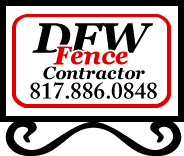
Fort Worth Fence Regulations
Fences provide an aesthetically pleasing, yet functional and useful touch to any property. They increase curb appeal, provide security, and keep young children or pets from wandering off. As a landlord, you may be considering putting up a fence at your rental property to boost the value of your rental. In the Fort Worth area, it is not as simple as just putting up a fence. You have to do your research on size, style, and materials all regulated under city building codes. Here, we break down the Fort Worth fence regulations you need to follow and how they can impact your bottom line.
There are specific materials you must use when erecting a fence on your Fort Worth rental property. These material regulations are in place to ensure that materials used to build a fence do not block free air circulation and light to neighboring properties. This means that materials used must allow air and light to pass through the fence. In the instance of a privacy fence, the fencing itself should not impact lighting to neighboring yards or change the way people view the general area.
There are also specific height regulations for fencing in Fort Worth. If you decide to build a fence above four feet tall, you will need to get a permit to fence your rental property. Regardless of materials used, any fence over four feet tall will require a permit because it may block or reduce the airflow and light to neighboring properties. In addition to the four foot rule, corner fences cannot be more that 2.5 feet tall. This rule is very important for safety reasons as a fence taller than 2.5 feet can block visibility of vehicles. Note that any fence over nine feet tall is considered a structure and will therefore fall under different code regulations.
Backyard fencing, while still regulated, is allowed in Fort Worth to allow property owners a sense of security and extra privacy. Because of this, backyard fences are allowed up to six feet tall before you must get a permit. The materials used for a backyard fence also cannot prohibit neighboring yards light or airflow. You also must ensure that there is rear accessibility to your property for the use of emergency services. Often, consulting a local fencing professional like DFW Fence Contractor will give you the best insight into making an informed decision about where to put your fence.
There are specific places you will need to get permission and extra permitting in order to erect a fence. If your rental property is in a historical district or a flood zone, you will need to submit a formal permit application—regardless of the height—and receive an inspection before you can move forward with your building project.
It is important to keep in mind that breaking any of the Fort Worth fence regulations can result in the destruction of your fence and a hefty fine. For this reason, it is essential to get your rental property fence right the first time. This will save you significantly in building materials, money, and time—all increasing the overall value of your property. Taking the time to research the best options for your property can make building a fence an investment that will provide many benefits for years to come.
Do I need a permit for my project?
Residential building permits are for one or two family detached homes and their accessory structures on individually platted lots.
Permits are required for new construction, as well as work that changes, moves or repairs walls, floors, ceiling, windows, doors, electrical, mechanical or plumbing.
Permits are not required for “cosmetic” remodels (floor or wall covering, cabinets, counter tops, shelving, etc.) or plumbing fixture replacement.
All permits may be applied for online. Permit applicants must be a registered building contractor or must meet the requirements for a homestead permit, which include working on a building owned and occupied by them solely as their primary residence as demonstrated by either a homestead exemption granted by the appraisal district.
